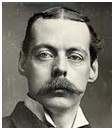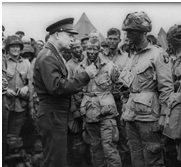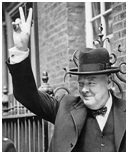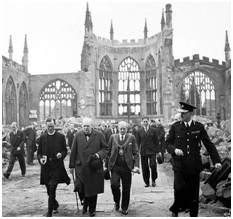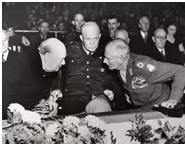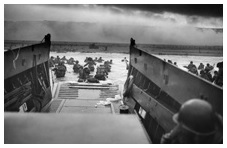|
 |
|
 |
|
|
||
Winston Churchill Leadership
Winston Churchill (1874-1965)
Voted greatest Briton by a 2001 BBC poll, because he (pictured right) led the British to victory in the Second World War after facing certain defeat in 1940.
For more detail see... The Battle of Britain and D-Day in the History Highlights section.
Why was he a great leader in the Second World War?
1. Purpose He had only one objective which he communicated as soon as he became prime minister in 1940. “Our aim is...victory, victory at all costs”, he said.
2. Valour This means having the courage, determination, and, if necessary, ruthlessness, to do what’s right. He destroyed the defeated French fleet in 1940 (despite his love for them), clearly showing Britain’s intent to fight on against Germany. His valour (which he thought was the most important virtue) came from huge self-belief. The night after he became prime minister, he was sure he wouldn’t fail, because, he said: “ I felt I was walking with destiny and that all my past life had been but a preparation for this hour and for this trial”.
3. Hard work and stamina “I have nothing to offer but blood, toil, tears and sweat”, he said in his first speech as prime minister in 1940. He worked long hours: 8 a.m. to 2.30 or 3 the next morning (with at least an hour’s sleep after lunch!) But his family suffered: two of his children had alcohol problems and another committed
suicide. He was ambitious to overcome the insecurity of his aristocratic childhood at Blenheim Palace and boarding school, exacerbated by his unloving parents. He particularly wanted to prove himself as a worthy successor to his father, Lord Randolph Churchill (pictured right) , Chancellor of the Exchequer in 1886.
4. Humility He always believed that the British people won the war, not him, and his duty was to serve them. He saw everyone as equal human beings and said: “The price of greatness is responsibility”. He managed to convince people that he was their servant, despite having the powers of a dictator. Dwight D. Eisenhower, the American commander-in-chief of D-Day (pictured right with his troops), admired Churchill’s humility and saw him talking to soldiers with tears of gratitude.
5. Lifelong learning He always learned from:
a) his and other people’s mistakes He learned from history, and he never forgot his disastrous decision to invade Gallipoli in 1915 through the Dardanelles into Turkey.
Aware of his limitations, he accepted the criticism and advice of his military chiefs (e.g. to evacuate France in 1940 at Dunkirk, pictured right). Decision making was improved by:
“Out of intense complexities, intense simplicities emerge”, he said. For example, it was a simple decision to invade France on D-Day , despite the enormous difficulties involved.
6. Inspiration and empowerment He inspired and united ordinary people to become all conquering heroes. How? a) trust In the 1930’s he was alone in attacking Hitler, and people believed in his integrity.
b) pugnacity Resilient, confident and never contemplating defeat, epitomized by:
c) speeches: Some of the greatest in the English language and always positive and inspiring, despite being aware of
Britain’s perilous position. After the evacuation of the British army at Dunkirk he told his military assistant, General Ismay (pictured right) “You and I will be dead in three months' time"
d) empathy He understood the problems that ordinary people were facing. “It was the nation ...that had the lion heart. I had the luck to be called upon to give the roar”, he said.
7. Kindness Despite his occasional fierceness with staff, ruthlessness and huge ego, he was kind, witty and charming. He strongly supported magnanimity in victory after resolution in war. He treated his staff like members of a big family and showed great compassion to the British people. His visits to bomb hit people during the Blitz in1940-1 won their support (pictured right in the ruins of Coventry Cathedral in 1940).
8. Priorities and action As a perpetual optimist, he always looked for opportunities, not difficulties, and inspired people to act. Everything he did was geared towards getting results from others, constantly asking why strategies weren't successful. He cut out unnecessary paperwork, made priorities and stuck a red label, “action this day”, on urgent communications. He also adapted extremely well to changing circumstances.
9. Great staff He picked great military leaders, like Bernard Montgomery (pictured together right with Eisenhower in the middle), Montgomery's victory at El Alamein in 1942 was a big turning point of the war for Britain. Churchill also united the three military services and motivated his staff. He trusted them (giving them all available information) and never bore a grudge for long. His most important adviser was his military assistant, General Ismay.
10. Relaxation His wife, Clementine (pictured right ), gave him great support and once told him in 1940 he was being too hard on his staff (advice he accepted). He thought that marrying her was his greatest achievement. His love of painting also relieved stress. He drank a lot to cope with his short but frequent periods of depression (what he called the “black dog”).
11. Luck Churchill's understandable strategic error of fully supporting France in 1940 would have been disastrous, if the Germans had pursued and defeated the British army at Dunkirk. Fortunately the head if the Royal Air Force, Hugh Dowding (pictured right), persuaded him not to commit all of Britain's fighter planes, so there were enough left to win the Battle of Britain.
12. Value innovation He supported war winning innovations like radar and the floating harbours (mulberries) used in the D-Day Normandy invasion(pictured right).
Key quotes on war and leadership We shall defend our island, whatever the cost may be. We shall fight on the beaches, we shall fight on the landing grounds, we shall fight in the fields and in the streets, we shall fight in the hills; we shall never surrender (4 June, 1940). Never in the field of human conflict have so many owed so much to so few (about the pilots in the Battle of Britain). To jaw-jaw is always better than to war-war. All the great things are simple, and many can be expressed in a single word: freedom, justice, honour, duty, mercy, hope.
Key quotes on success Success is the ability to go from one failure to another with no loss of enthusiasm. Never, never, never give up. Attitude is a little thing that makes a big difference.
Key quote on empowerment It was the nation ...that had the lion heart. I had the luck to be called upon to give the roar.
Key quote on the past, present and the future If we open a quarrel between past and present, we shall find that we have lost the future.
Key quote on decision making Don’t argue about the difficulties. The difficulties will argue for themselves.
Key quote on learning The empires of the future are the empires of the mind.
Key quotes on influence A fanatic is one who can’t change his mind and won’t change the subject. Courage is what it takes to stand up and speak; courage is also what it takes to sit down and listen.
Key quotes on positive thinking I am an optimist. It does not seem too much use being anything else. A pessimist sees the difficulty in every opportunity; an optimist sees the opportunity in every difficulty.
Key quote on strategy However beautiful the strategy, you should occasionally look at the results. |
|
|
||
|
|
||
| Copyright © wisdomtowin.com 2025 All Rights Reserved | ||
|



